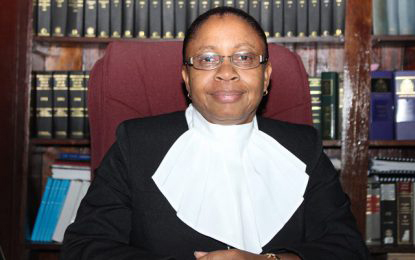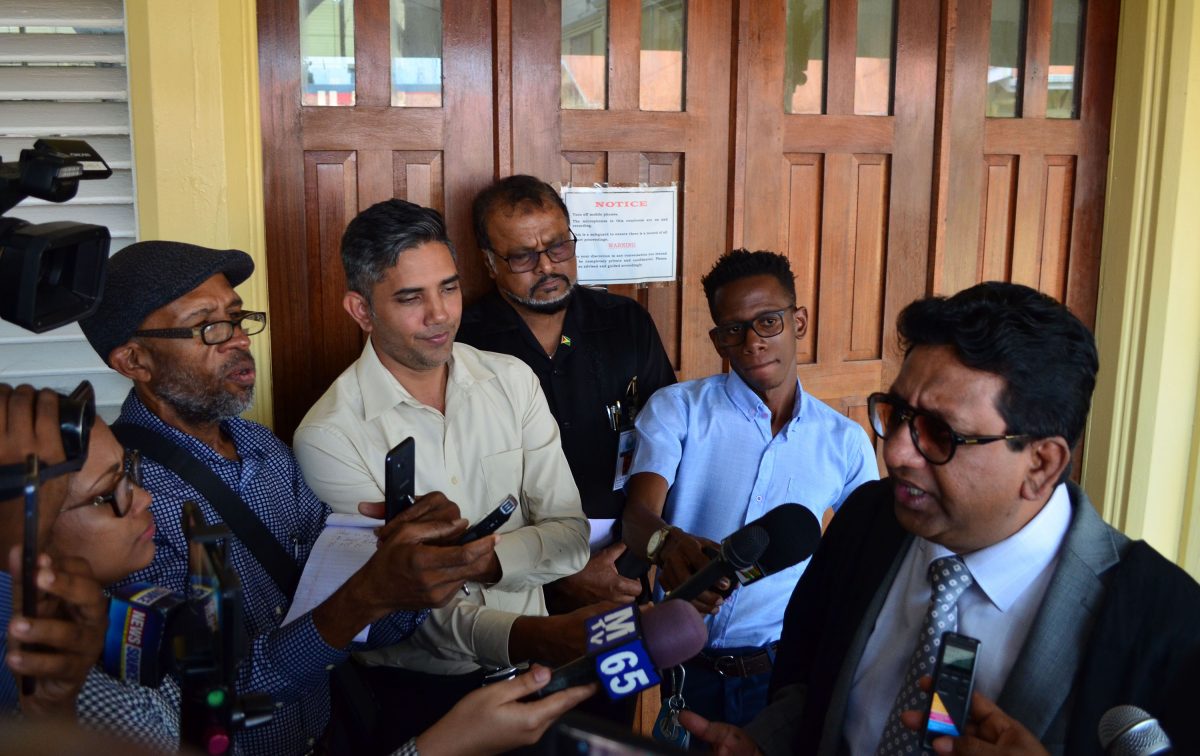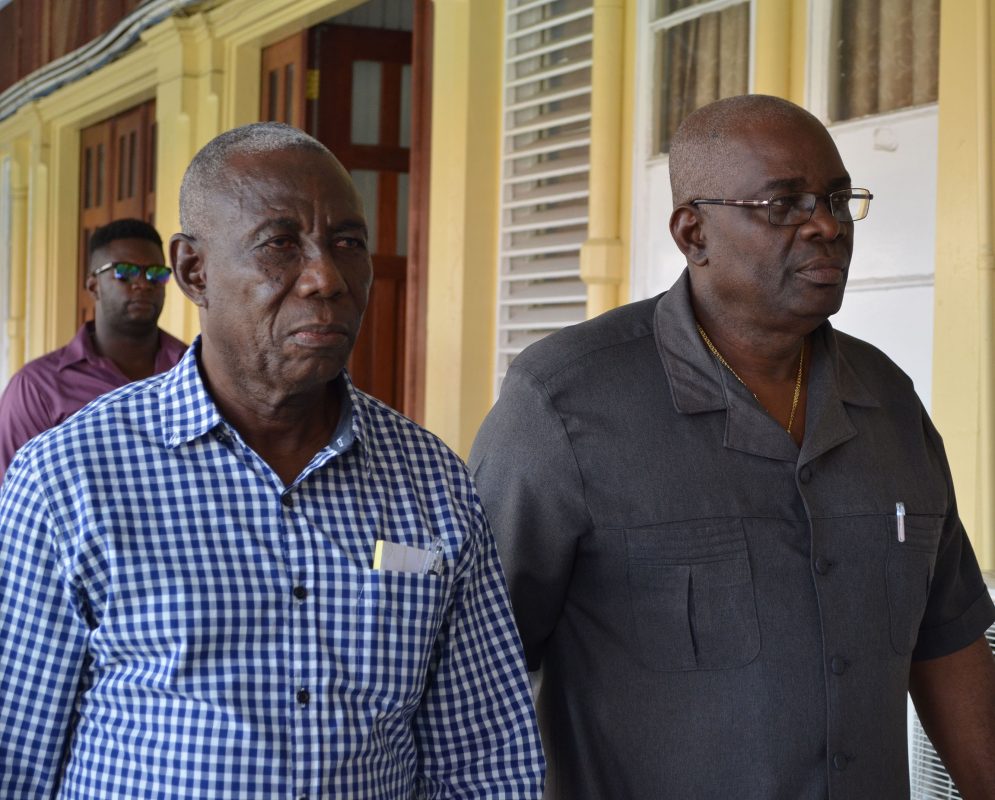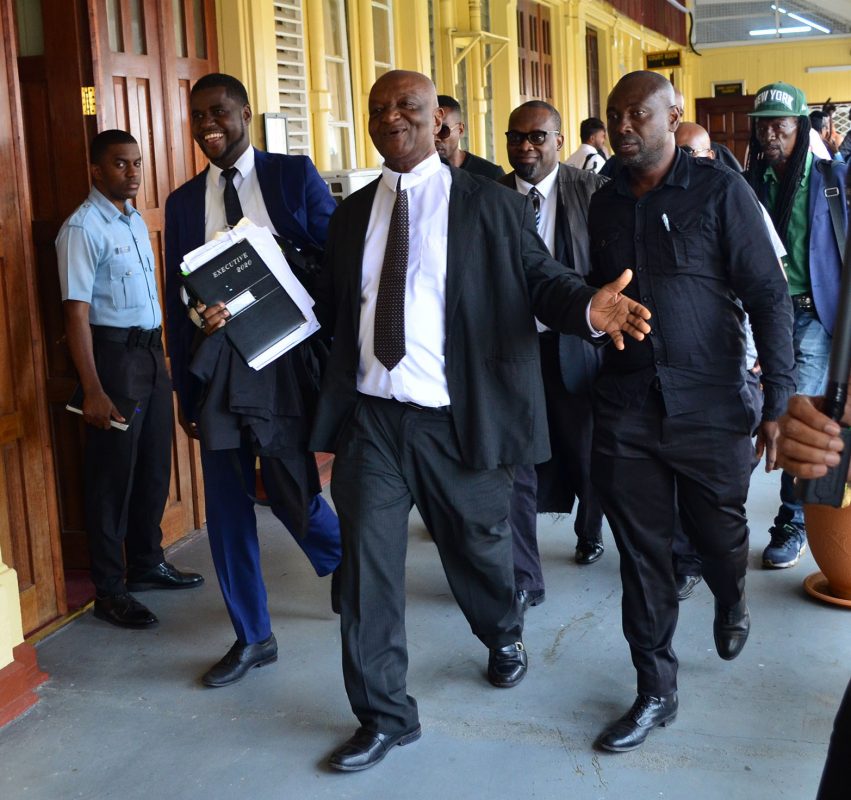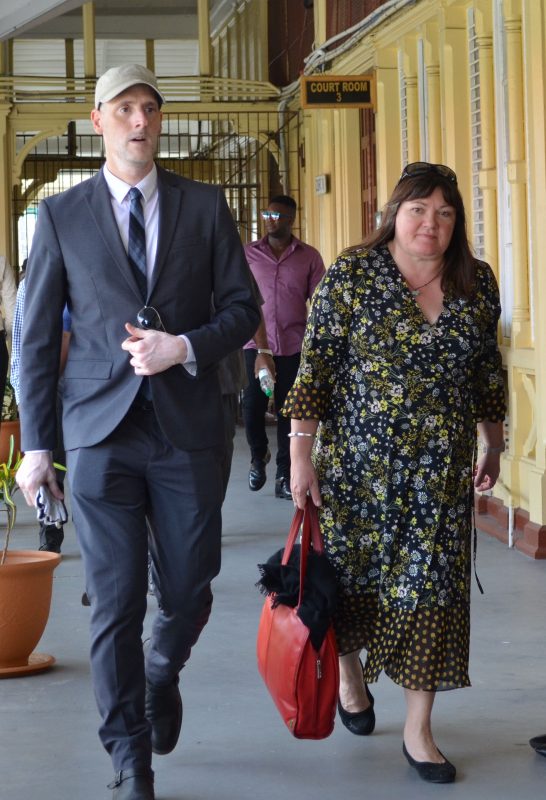-orders GECOM to take remedial steps
Photos by Orlando Charles
Acting Chief Justice Roxane George-Wiltshire has ruled that the purported declaration of results for Region Four, by Returning Officer (RO) Clairmont Mingo, following the March 2nd general elections was unlawful as it did not conform with requirements in Section 84 of the Representation of the People Act.
As a consequence, the declaration was set aside and the judge has ordered the Guyana Elections Commission (GECOM), given the urgency of the matter which is of national importance and interest, to begin bringing itself in conformity with the law, no later than 11 this morning.
Declaring the declaration null, void and of no effect, the Chief Justice also made it clear that there therefore could be no declaration of any final results of the elections, until the declaration of the vote count for electoral district four is properly done.
The Chief Election Officer she said, can make no final declaration until and unless this vote is completed in a transparent manner before the persons duly authorized to be present, a requirement which she said is mandatory and not merely directory as had been argued by counsel for the Commission.
This, she observed, would preserve the integrity of the process and ensure confidence in the Commission which is to be transparent, impartial and fair and to “publicly” declare results as required by the Act.
The judge found that there was “substantial non-compliance” with the law when Mingo declared the results, which vitiated the vote count for Region Four.
As a result, the judge granted the injunction sought by Opposition PPP/C supporter Reeaz Holladar to restrain the Election Commission from declaring any final result since the manner in which the purported declaration of votes for district four flouted the law.
Last Thursday, GECOM—a respondent in the matter, along with Chief Election Officer Keith Lowenfield and Mingo—controversially declared the results for the district, which show the incumbent APNU+AFC coalition securing 136,335 of the valid votes cast compared with 77,259 votes secured by the PPP/C.
Though the Chief Justice found the declaration to be unlawful, she made it clear that it is within the ambit of GECOM alone, to decide whether it will restart the process of tabulating and presenting the votes, or whether it will continue from where it had previously left off.
Also, Justice George-Wiltshire made it clear that it was for the RO, who alone has the statutory duty, to decide on the manner and method to be used for validating the vote count, and no one else.
Against this background the judge pointed out that observers and party agents alike have absolutely no say, though she said that the RO must act in a transparent, reasonable manner.
While the verification process of the tabulation of votes for district four had commenced earlier, last Thursday, it was halted with the understanding that it would be resumed later. However, following a commotion which erupted at GECOM’s command centre between local party observers on both the government and opposition sides, Mingo began announcing the results for district four.
His attempts were, however, drowned out by loud shouting from members of the opposition and other political parties. It was after this that GECOM’s Public Relations Officer Yolanda Ward disseminated the results to the media via WhatsApp.
The statutory Declaration Form 24 was signed by Mingo and countersigned by Volda Lawrence the incumbent incumbent APNU+AFC Counting Agent. All other Counting Agents refused to sign the document.
Noting that blame is to be assigned on all sides for the manner in which the proceedings degenerated into mayhem at the command centre, the judge said that greater responsibility needs to be shown by the political parties and respect for each other for the process to conclude.
The judge said that it was for the RO to decide in accordance with the law the way forward as well as the persons to be present during the tabulation process.
Section 86 (1) of the Act states that no person shall be present at the counting of votes except the Returning Officer and such other election officers as he may appoint to assist him in the counting, members of the Commission, duly appointed candidates and such other persons as, in the opinion of the RO, have good reason to be present.
She said that it is therefore the RO who has the discretion regarding the prescribed persons to be present as stated in the Act, and also which election officer would be present and offer him assistance.
She noted that not all the persons listed in that provision have to be present.
To this pronouncement, Attorney Anil Nandlall, one of Hollader’s attorneys, tried desperately after the judge’s ruling to persuade her to make an order allowing party representatives to be present and be heard.
The judge, however, said that she could not so do, but urged all involved to act responsibly even as she reminded that that was within the purview of the RO.
“You can’t turn up there with a multitude of people,” she, however cautioned.
Justice George-Wiltshire said that she could not for example say that any particular amount of party representatives should be allowed or not, but again urged all to be responsible, even as she noted that it was irresponsible behaviour which had resulted in the litigation before her in the first place.
The Chief Justice also noted that it is the Statement of Polls (SOPs) in the possession of the RO which he would have received from the various Deputy Presiding Officers (DROs) that would form the basis of any tabulation, and not an SOP supplied by any other person.
Section 84, which specifies the process for the counting of votes, prescribes, among other things, that as soon as practicable after the receipt of all the ballot boxes and the envelopes and packets delivered to him in pursuance of Section 83 (10), the RO shall, in the presence of those legally entitled to be in attendance, ascertain the total votes cast in favour of each list in the district by adding up the votes recorded in favour of the list in accordance with the statements of poll (SOPs) and thereupon publicly declare the votes for each list of candidate.
Emphasizing that the process of verification needed to be done in the presence of persons duly authorised to observe, the judge said that the fact that Mingo went ahead and purported to declare results in their absence, with more than 400 SOPs still to be verified, the process became flawed.
She said, too, that contrary to the arguments advanced by counsel for the respondents—Neil Boston SC, with an additional 458 SOPs to be verified from 879, Mingo could not be regarded as having substantially complied in accordance with the Act.
It was on this ground that she noted there was substantial non-compliance, while stating that less than half had been verified.
Senior Counsel Douglas Mendes, one of Hollader’s other attorneys, had challenged the position proffered by Boston, pointing out that with less than 50% of the votes for District Four having not been verified, Mingo could not be regarded as having substantially complied with the law.
Mendes pointed out, too, that at no point did the respondents deny that the verification of the remaining SOPs had not been done in the presence of observers as required by Sections 84 (1) and 86 (1).
Citing case law, the judge had made it clear as she had previously been reminding, that her role and the aim of her decision was not to say what the results were/are to be, but rather to ensure that the declaration of the votes for Region Four were in accordance to law.
She said that a significant number of votes still needed to be verified in accordance with the Act.
Before chaos erupted at the command centre, only 421 SOP’s had been examined in the presence of observers.
Justice George-Wiltshire said that there is uncertainty as to how the votes in question were tabulated and purportedly declared between the gap when Mingo had fallen ill and had to be rushed to the hospital, the proceedings being halted and then reconvening—at which point the RO began announcing the results.
She said that his affidavit did not provide any guidance on this issue either, as he did not so state.
In the absence of credible evidence as to what transpired during this gap, the judge said that the supposed declaration would have been unlawful.
Boston had previously tried to rely on the principle of the presumption of regularity, arguing that Mingo would have said that he made the declaration and that this would have been enough to negative any doubt that he did.
The judge, had, however said that the RO needed to substantiate the means by which he would have so done.
Referencing a case decided by former Chancellor Desiree Bernard, and emphasising her call for all involved to act responsibly, Justice George-Wiltshire said that it was sad that after some 19 years since the case of Hamilton and GECOM and others, the country seemed still plagued by post-elections chaos.
She quoted from that case thus, “…the role of the Elections Commission and its staff is to take such action as appears necessary to ensure impartiality, fairness and compliance with the provisions of the constitution and any other acts of parliament.”
It further went on to say, “in the present volatile situation which pervades our country, no effort must be spared to assure everyone that the process was fair and impartial. Lingering doubts that hang like the sword of Damocles over the head of the Commission must be removed. Confidence in the electoral process must be restored. This is absolutely essential if we as a nation are to move forward and strive to heal the wounds that divide use. Let fairness pervade all of our actions at all times.”
Before delivering her ruling, the Chief Justice had said that she was aware of the national importance of the case before her and the widespread interest it had attracted, but noted that while it would excite emotions, the court’s ruling ought to be honoured and had asked for no audible reactions while the judgment was being read nor untoward messages being transmitted.
She had observed that while polling went smoothly, it was the calm before the storm—a storm she said, which could only have been calmed by adherence to the Representation of the People Act.
While the regional results for all the other nine electoral districts were publicly declared by their respective district Returning Officers, the results for District Four were released to the media fraternity via WhatsApp after 9 of the 10 parties contesting objected to attempts by Mingo to make this declaration.
If the numbers are accurate and are mirrored at the general elections, the APNU+AFC coalition would have won the elections by in excess of 7,000 votes or one seat.
GECOM was ordered to pay court costs to the applicant in the sum of $500,000.
Since the completion of voting more than a week ago, citizens have been waiting anxiously to see who will form the next government. Both the APNU+AFC and PPP/C have claimed victory.
The Chief Justice’s courtroom was packed to capacity as it had been for the three previous days as many flocked to hear the highly anticipated ruling. Among them were government and opposition members, local and international observers, members of civil society, attorneys and members of the public.
With seating capacity meeting its maximum, many persons listened from the corridors via the live feed through speaker boxes which were set up outside the courtroom.
Meanwhile, scores of jubilant government supporters sporting their party colours—green and yellow congregated behind the barricades which were set up on the streets outside the court.
Dozens of police officers–more than had been previously deployed, lined the street to control the crowd and provide reinforced security.
